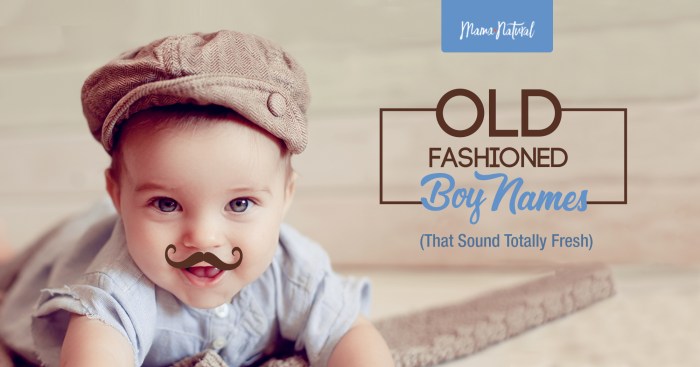Mens Old-Fashioned Names A Timeless Appeal
Popularity Trends of Old-Fashioned Men’s Names: Mens Old Fashioned Names
Mens old fashioned names – The popularity of names ebbs and flows throughout history, reflecting societal shifts and cultural trends. Old-fashioned names, once common, often experience periods of decline before potentially experiencing a resurgence. Examining these fluctuations provides insight into naming conventions and societal values.
Popularity Trends Over the Past Century
A line graph visualizing the popularity of names like Arthur, Walter, and Edward over the past century would show distinct peaks and troughs. For example, Arthur’s popularity was high in the early 20th century, declined mid-century, and experienced a slight resurgence in recent years. Walter followed a similar pattern, while Edward maintained a steadier, though less prominent, presence throughout the century.
Data points for each decade would highlight these variations, demonstrating the cyclical nature of name popularity.
Comparative Ranking of Classic Names
| Name | 1920 Ranking | 1970 Ranking | 2020 Ranking |
|---|---|---|---|
| James | 1 | 11 | 17 |
| Robert | 2 | 2 | 56 |
| John | 3 | 16 | 22 |
| William | 4 | 6 | 10 |
| Richard | 5 | 26 | 101+ |
Historical Overview of Name Popularity
The rise and fall of names like Reginald, Clarence, and Cecil are illustrative. Reginald, popular in the early 1900s, fell out of favor as more modern names gained traction. Clarence, associated with a specific era, experienced a sharp decline. Cecil, once relatively common, has remained consistently uncommon throughout the 20th and 21st centuries. These shifts reflect changing social preferences and the influence of popular culture and media.
Cultural and Regional Variations in Name Usage
The prevalence of traditional names varies significantly across different English-speaking countries. Cultural norms, historical events, and regional identities influence naming practices. Examining these differences provides a fascinating glimpse into the diverse linguistic landscapes of these nations.
The resurgence of classic names like Arthur and Theodore reflects a broader trend toward traditional aesthetics. This extends beyond nomenclature; it’s also visible in men’s fashion choices, particularly with the enduring popularity of timeless pieces such as mens fashion polos. These versatile shirts, often made from breathable cotton, offer a clean and classic look that complements the sophisticated feel of old-fashioned names.
Ultimately, both classic names and classic clothing choices speak to a timeless sense of style.
Prevalence of Traditional Names in English-Speaking Countries
| Country | High Popularity Names | Moderately Popular Names | Less Popular Names |
|---|---|---|---|
| USA | William, James, Robert | Charles, Henry, George | Reginald, Cecil, Percival |
| UK | James, George, William | Edward, Arthur, Thomas | Reginald, Stanley, Cuthbert |
| Australia | William, James, Thomas | David, John, Michael | Archibald, Oswald, Humphrey |
| Canada | James, William, John | Robert, David, Michael | Clarence, Edgar, Silas |
Impact of Historical Events on Name Adoption
The aftermath of World War I and II significantly impacted naming trends in many countries. The rise of more modern and less formal names was partly a reaction against the perceived formality and traditionalism of pre-war naming practices. In contrast, some countries experienced a renewed appreciation for traditional names in subsequent decades, indicating the complex relationship between historical events and naming patterns.
Cultural Sub-Group Naming Preferences
Within the United States, for example, distinct naming preferences exist among different cultural subgroups. For instance, traditional names might be more common among certain religious communities, while more modern names are prevalent in others. Similarly, regional differences within the US also influence name choices, reflecting varied cultural backgrounds and historical influences.
The Perception and Connotations of Old-Fashioned Names
Old-fashioned names often evoke specific stereotypes, both positive and negative. Understanding these perceptions is crucial in analyzing their appeal and usage in modern society. The sound and feel of a name significantly impact its overall impression.
Stereotypes Associated with Old-Fashioned Names
Men with old-fashioned names might be perceived as either sophisticated and distinguished or as outdated and stuffy. Positive stereotypes often associate these names with strength, stability, and tradition. Negative stereotypes might depict them as being out of touch or lacking modernity. The specific connotations vary greatly depending on the name itself and the cultural context.
Influence of Name Sound and Feel
The “sound” of a name – its rhythm, syllables, and overall phonetic quality – influences its perceived appeal. Names with strong, assertive sounds might be considered more powerful, while names with softer sounds might be perceived as gentler. The “feel” – the overall impression or connotation evoked – is equally important and contributes significantly to a name’s perceived suitability.
Perceived Maturity Level Associated with Names
Classic names are often associated with a higher level of maturity compared to more modern names. This perception is partly due to the historical context of these names and their association with older generations. However, the perceived maturity level can also be subjective and influenced by individual experiences and cultural backgrounds.
Modern Adaptations and Variations of Classic Names
Parents often adapt old-fashioned names to create more contemporary-sounding versions, either through variations or nicknames. This allows them to incorporate the appeal of classic names while maintaining a modern sensibility.
Modern Variations and Nicknames
- William -> Will, Liam
- Robert -> Rob, Robbie
- Edward -> Ed, Eddie
- Charles -> Charlie, Chuck
- Arthur -> Art, Artie
Creative Incorporation of Classic Elements

Source: mamanatural.com
Parents might combine elements from old-fashioned names with more modern sounds to create unique names. For example, combining elements from “Arthur” and “Henry” to create a name like “Arthery” illustrates this creative approach. This blending of old and new reflects a desire for names that are both distinctive and familiar.
Categorization of Old-Fashioned Names by Origin
| Origin | Examples | Origin | Examples |
|---|---|---|---|
| Greek | Arthur, Theodore | Latin | Edward, Richard |
| Germanic | Walter, William | Hebrew | Samuel, Benjamin |
The Appeal of Old-Fashioned Names in Modern Society
The resurgence of popularity for certain old-fashioned names in recent years is a complex phenomenon driven by various factors. Parents are increasingly seeking names that offer a sense of timelessness, uniqueness, and connection to history.
Reasons for Resurgence of Popularity
Several factors contribute to the renewed interest in old-fashioned names. A desire for unique and less common names is a significant driver, as parents seek to differentiate their children from peers with more ubiquitous names. The perceived strength, sophistication, or classic appeal of these names also plays a role.
Appeal to Parents Seeking Unique or Timeless Names, Mens old fashioned names
Parents seeking names that are both distinctive and enduring are increasingly turning to old-fashioned names. These names often possess a sense of elegance and timelessness that appeals to those who value tradition and heritage. The unique nature of many old-fashioned names provides an alternative to the more common names often found on contemporary baby name lists.
Reasons for Choosing Classic Names
- Uniqueness and distinction
- Timeless and enduring quality
- Strong and positive connotations
- Family heritage and tradition
- Sophistication and elegance
FAQs
What are some examples of less common old-fashioned names?
Less common examples include names like Reginald, Cecil, and Eustace.
How do old-fashioned names compare in popularity to modern names?
Popularity varies greatly; some classic names remain consistently popular, while others experience periods of resurgence or decline. Modern names often reflect current trends and cultural influences.
Are there any resources for researching the origins and meanings of old-fashioned names?
Yes, many online resources and books dedicated to baby names provide detailed information on name origins and meanings.
Do old-fashioned names carry any negative connotations in modern society?
Some may associate them with older generations or outdated stereotypes, but many find them sophisticated and unique.














